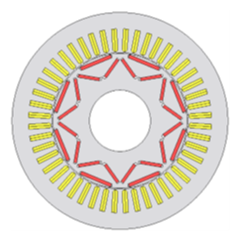Overview
Motor designs must realize the required performance within the temperature limits set for parts. For this reason, engineers evaluate short-time and continuous duty ratings for these limits. The continuous operation of a motor under a specific load is more susceptible to rising temperatures that result in lower torque, electrical breakdown and part deformation. All of these adverse characteristics can negatively impact motor lifespans. That is why predicting temperature rises during continuous operation is vital to creating designs that fall within a permissible tolerance range.
JMAG simulates the mutual relationship between the magnetic fields and thermal properties to quickly obtain highly precise efficiency maps that take into account the temperature limits of coils and magnets. Analyses of the motor efficiency and torque can only prevent reworking designs when designs include the temperature rise in evaluations at the initial design stage.
This case study creates an efficiency map for the continuous operation of a nabla-shaped IPM motor that takes into account the temperature constraints. The analysis shows the motor design has a safe operating area at or below roughly 5,000 rpm. Designers can even use these results to examine the system design, whether investigating a cooling method suitable for the usage conditions or a magnetic circuit to reduce the losses.

IPM Motor
Temperature Constraints for Each Part
| Coil temperature limit | 140 deg C |
| Magnet tempetaure limit | 100 deg C |
Fig. 1 IPM Motor and Temperature Constraints for Each Part
The case study evaluates efficiency maps for a nabla-shaped IPM motor with 8 poles and 48 slots
running in a continuous duty cycle while accounting for the temperature limits of parts.
You need to sign in as a Regular JMAG Software User (paid user) or JMAG WEB MEMBER (free membership).
By registering as a JMAG WEB MEMBER, you can browse technical materials and other member-only contents for free.
If you are not registered, click the “Create an Account” button.
Create an Account Sign in



